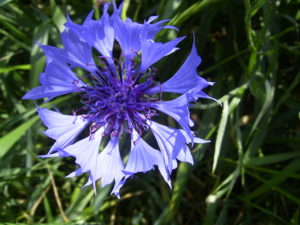
Centaurea cyanus, commonly known as cornflower, is an annual flowering plant in the family Asteraceae, native to Europe.
Contents
Uses
The cornflower is considered a beneficial weed, and its edible flower can be used for culinary decoration, for example to add colour to salads. In herbalism, a decoction of cornflower is effective in treating conjunctivitis, and as a wash for tired eyes. Cornflowers have been used and prized historically for their blue pigment. Cornflowers are often used as an ingredient in some tea blends and herbal teas, and is famous in the Lady Grey blend of Twinings.
Benefits
- Cornflower contains biotin that helps in strengthening the nails, prevents and treats nail infections, and treats hair problems like dandruff. Cornflower is used in many hair care and skin care products because of its anti-fungal, anti-bacterial, and anti-inflammatory properties. It is even used in shampoos and hair rinses to treat scalp eczema.
- Cornflower is used for easing eye irritation and treating problems like sore eyes, conjunctivitis, and even skin irritation around the eye because of its effective anti-inflammatory and astringent properties. Cornflower tea is used as an eye wash to relieve swelling and pain.
- The bitterness of cornflower makes it an effective natural remedy against a variety of digestive problems like constipation, diarrhea, indigestion, gas, and other gastrointestinal complaints. It also acts as an appetite stimulant and is therefore used for treating cases of anorexia as well.
- The flowers of this plant are used as an expectorant, diuretic, and stimulant for gall bladder and liver function. It also supports and regulates the functioning of the kidneys. Therefore, people suffering from kidney, liver, or spleen problems can take prescribed doses of this herb for relief from symptoms of these disorders.
- Cornflower is very commonly applied topically to wounds, cuts, and other ulcerations. You can either use the juice from its leaves or make a poultice and apply it to the wounds for quick relief from pain and inflammation.
- Cornflower is also used as an astringent oral rinse for treating mouth ulcers.
- Women suffering from endometriosis can take cornflower preparations to ease menstrual cramps and other related symptoms.
- Cornflower has a calming effect on the nervous system and it therefore beneficial to those suffering from anxiety, stress, depression, and other nervous system disorders.
Cautions
- There is no safety information currently available for blue cornflower. Cornflower is likely safe when used as a flavoring or in traditional medicinal amounts.
- Use cautiously in patients taking anti-inflammatory agents.
- Use cautiously in patients in treatment for urinary tract stones.
Interactions
Interactions with Drugs
- Cornflower flowers may have anti-inflammatory properties and caution is advised when taking cornflower with other anti-inflammatory agents.
- Flowers of the blue cornflower may prevent the recurrence of urolithiasis (urinary tract stones). Caution is advised when taking drugs used to treat urolithiasis.
Interactions with Herbs and Dietary Supplements
- Cornflower flowers may have anti-inflammatory properties and caution is advised when taking cornflower with other anti-inflammatory herbs or supplements.
- Flowers of the blue cornflower may prevent the recurrence of urolithiasis (urinary tract stones). Caution is advised when taking other herbs and supplements used to treat urolithiasis.
Other names
n/a
References
Livingnaturally, http://www.livingnaturally.com/ns/DisplayMonograph.asp?StoreID=3D9D155236034A5897378F7C5A033221&DocID=bottomline-cornflower
Homeremedies, http://www.home-remedies-for-you.com/herbs/cornflower.html
